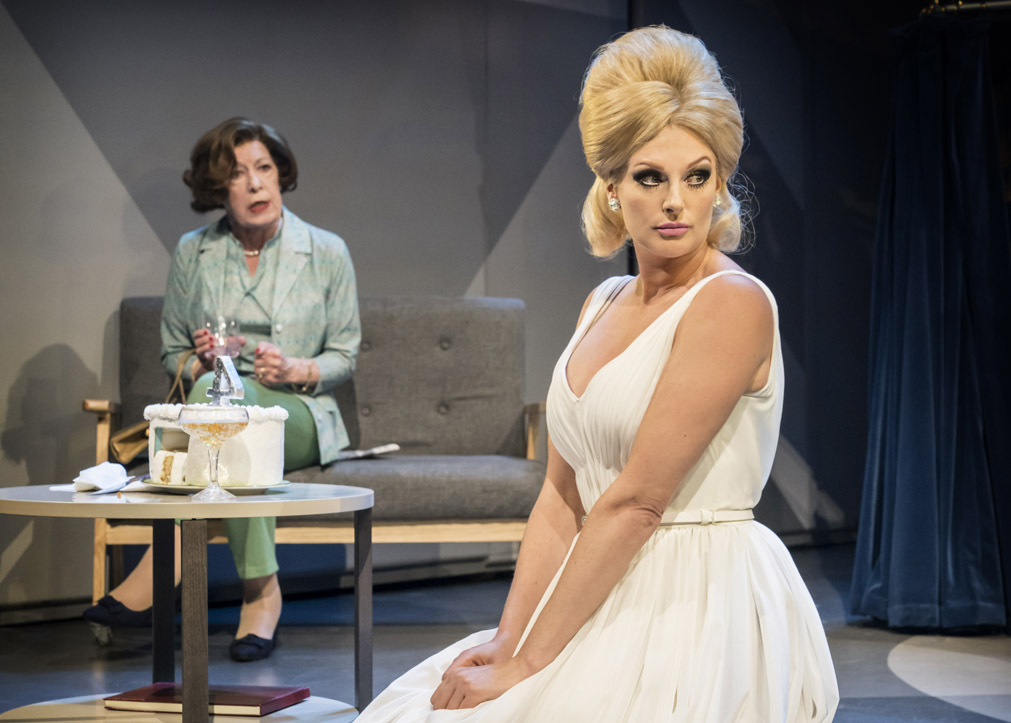
For an audience largely made up of baby boomers, this was something of a homecoming – those songs, that voice – the very wallpaper of sixties youth was unrolled before us in this new telling of the story of Dusty Springfield.
Written by Jonathan Harvey and directed by Maria Friedman, the show kicks off in Sixties style, with a re-enactment of the television show Ready Steady Go. Adorned in black and white striped mini dresses, the TV ‘audience’ gyrate as Manfred Mann’s theme tune 5-4-3-2-1 kicks up the adrenaline. And suddenly there she is, at Number 4 in the charts with I Only Want to Be With You, our own Mary Isobel Catherine Bernadette O’Brien, aka Dusty Springfield, complete with bouffant hair and coal-black eye makeup.
Katherine Kingsley as Dusty is stepping into to some big shoes here, literally (O’Brien apparently inherited her father’s big feet) and metaphorically. Dusty Springfield has often been cited as the female voice of the 1960s. There was certainly no room for Kingsley to fall short vocally. 18 songs later the audience was on its feet to acclaim her performance.
There is little preamble to Harvey’s libretto. We go straight in at the sharp ascent of Dusty’s solo career. There is nothing about her early musical explorations, or her collaboration with her brother Tom during their time in the folk trio The Springfields.
Backstage, we get a first glimpse of Dusty’s extreme insecurities. Exchanges with her mum Kay (Roberta Taylor), a surprising backstage regular, who still sees her daughter as ‘Pudge’, the plump and short-sighted girl she raised, are of no help. A dysfunctional upbringing has left Mary’s inner life in turmoil. Confused too over her sexuality orientation, there are plenty of demons racing around Mary O’Brien’s head. It was ultimately Mary’s singular voice, and her own construct, the star Dusty, a persona to hide behind, which allowed her to express herself. What we later learn is that Springfield had innate musical abilities that sought realisation in both performance and production, something she would take little credit for in her lifetime in a male-dominated world. If her own high standards were not met, she could be very difficult to work with, resulting sometimes in explosions of frustration that, like her parent’s spats, could end in crockery being thrown around.
Dusty doesn’t stint on the hits. With backing throughout from an excellent 7-piece live band, songs by Burt Bacharach: Wishin’ and A Hopin’, I Just Don’t Know What To Do With Myself, and The Look of Love, sit with other classics – the proto-feminist pop anthem You Don’t Own Me; Son Of A Preacher Man, Carole King’s Goin’ Back; finally leading to the magnificent pomp of You Don’t have To Say You Love Me, for which Springfield reportedly took 47 takes to record. Kingsley was always equal to the range and delivery of the songs, filling the room with controlled and powerful notes, pulling back with sensitivity during the quieter phrasings. With her faithful imitation of Dusty’s signature arm and hand movements, and dressed with iconic glamour, Kingsley’s is a performance that devotees of Dusty will adore.
Considerable attention is given to Dusty’s abortive trip to apartheid South Africa, from which she was deported because of her refusal to perform to segregated audiences. Later, inspired by the music coming out of Motown, in her role as compére on Ready Steady Go, she single-handedly unlocked the potential for black musicians to perform and sell their work directly to a UK audience. The Supremes, The Four Tops, Little Stevie Wonder and in particular, her favourites, Martha and The Vandellas all enjoyed breakthroughs thanks to her one-off special The Sound of Motown show.
Joanna Francis got the second biggest cheer of the night for her depiction of Lois, portrayed as one of Dusty’s more enduring gay lovers. Harvey’s writing avoids the more extreme of Dusty’s myriad tempestuous relationships, nor does it even hint at a possible liaison with Princess Margaret, but it does follow Dusty’s steady downward path once the UK tabloids start to pry into her ‘gayness’. Convinced that a new life would work in the States, instead a disastrous decent into booze, drugs, casual sex and self-harming in LA led to eventual incarceration in a sanatorium. Kingsley utterly convinces in these darker moments.
Elements of schmaltz sometimes marred an otherwise excellent production. Dusty’s friend Morgan’s simpering romantic overtures appeared neither likely or serious, and his subsequent song indulgent for example, as was the overly long deathbed scene. But there was some scintillating choreography, especially during Dusty’s triumphant return in the Pet Shop Boys’ What Have I Done To Deserve This? In which the ensemble dazzled with a routine with lighted frames.
Dusty, the Dusty Springfield Musical, especially with Katherine Kingsley as its head, brings one of Britain’s greatest female vocalists back for a glorious but painful reprise – ‘There is a sadness there in my voice,’ Dusty once said. ‘I was born with it. Sort of melancholy. Comes with being Irish-Scottish. Melancholy and mad at the same time.’ ★★★★☆ Simon Bishop 4th July 2018
Production photo by Johan Persson

